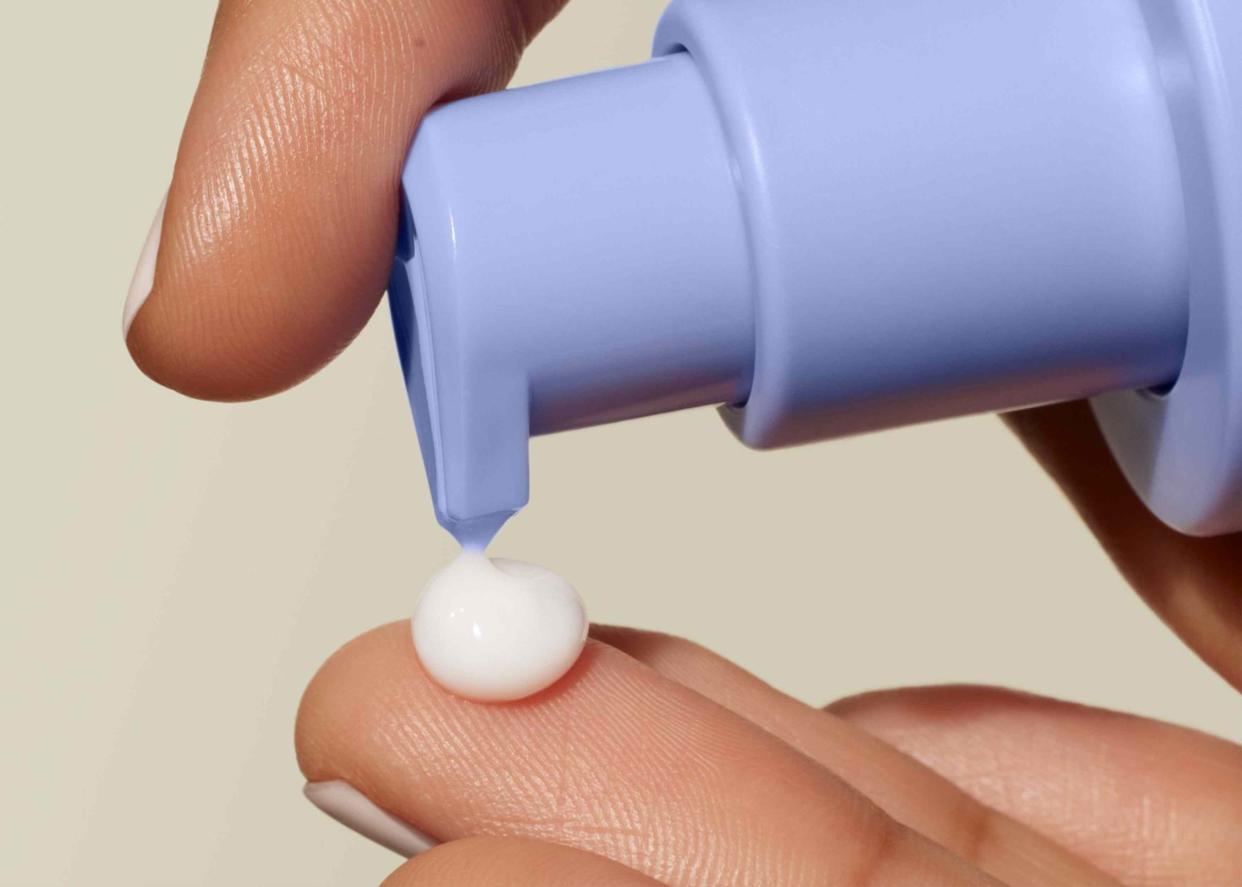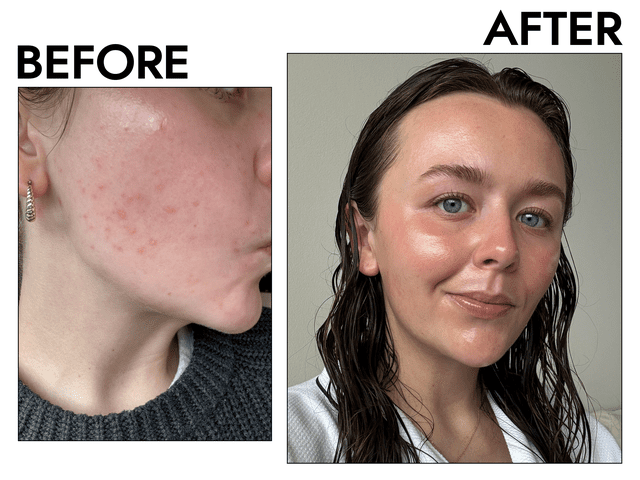How To Use Tretinoin (Retin-A) to Treat Acne—and the Results To Expect

@curology / Instagram
Fact checked by Aimee Simeon
Perhaps you've heard of tretinoin in terms of anti-aging ingredients. As the far more powerful evolution of retinol, its wrinkle-diminishing prowess has gained quite a bit of notoriety. "Tretinoin is one of the most powerful and widely researched vitamin A derivatives (retinoids)," explains board-certified dermatologist Dr. David Lortscher. "Tretinoin is considered the benchmark ingredient among dermatologists for treating acne, wrinkles, fine lines, and uneven skin tone." Better yet? It's also starting to gain a reputation amongst a number of acne treatments out there. Sound too good to be true? It might be, given that it comes with one very significant caveat: Tretinoin is a prescribed skincare ingredient. (Ooph.)
Jumping through hoops to get a skincare prescription is no small task, so the results better be worth the effort. We checked in with three board-certified dermatologists for the full scoop on tretinoin and if it's worthy of its repute (and exclusivity) for treating and preventing chronic acne.
Meet Our Expert
David Lortscher, MD, is a board-certified dermatologist and the founder and CEO of Curology.
Estee Williams, MD, FAAD, is a board-certified cosmetic and medical dermatologist based in New York City.
Anna Karp, DO, is a board-certified cosmetic, medical, and surgical dermatologist at the Skin Institute of New York.
What Is Tretinoin?
Tretinoin—the generic ingredient in the brand name Retin-A—is a topical, perscription-strength retinoid that dermatologists prescribe to treat acne. "Retinoid is just an umbrella term for many forms of vitamin A, with tretinoin and retinol being two examples (other examples include retinaldehyde and tazarotene)," says Estee Williams, a cosmetic and medical dermatologist based in New York City. "All of these differ from one another by their chemical and molecular structure, and the receptors that they bind within the cell; thus, their ultimate effects—and side effects—are slightly different."
Tretinoin
Type of ingredient: Retinoid
Main benefits: Treats acne; minimizes and prevents fine lines and wrinkles; evens out skin tone
Who should use it: In general, anyone with acne-prone skin or aging concerns; tretinoin is not recommended for pregnant people or those with rosacea
How often can you use it: Tretinoin can be used up to once per day depending on skin sensitivity and should be applied at night.
Works well with: Moisturizers
Don’t use with: Other exfoliators such as benzoyl peroxide, glycolic acid, and astringents, which may result in dryness and irritation
Tretinoin is most commonly prescribed in the treatment of acne, but like other retinoids, it hosts a slew of other skin benefits too. Behind sunscreen, tretinoin is the most effective anti-aging ingredient on the market, and is proven to treat signs of aging such as fine lines, wrinkles, unwanted texture, hyperpigmentation, and sun damage.
The Benefits
Exfoliates skin: "Tretinoin increases cellular turnover and chemically exfoliates the top layers of our skin," dermatologist Anna Karp explains. Translation: You get brighter, more even-textured skin without having to use harsh physical exfoliators like scrubs and brushes.
Creates more even skin tone: Dealing with dark spots from old breakouts or suntanning sessions? Thanks to its speedy exfoliating powers, tretinoin helps quickly fade skin discoloration.
Calms inflammation: "Tretinoin lessens the shedding of dead skin cells into the pore/hair follicle and decreases inflammation," says Karp.
Unclogs pores: "Acne is a multi-factorial disease with increased dead skin cells filling up in our pores, causing comedones," Karp explains. "Bacteria often colonize the pore, leading to worse acne." Tretinoin helps slough off dead skin cells before they can form comedones and attract that acne-causing bacteria.
Increases collagen production: Skin's production of collagen—the stuff in your dermis that makes skin look tight, plump, and youthful—naturally slows down as we age; sun damage puts a dent in your collagen supply, too. Tretinoin wakes up the collagen factory in your skin after just a few weeks of use.
Diminishes acne scars: In addition to kick-starting collagen formation in the skin, tretinoin also triggers collagen remodeling, which helps smooth the appearance of pitted, textured scars from acne and other skin woes.
Minimizes fine lines and wrinkles: If you want to turn back the clock on fine lines and wrinkles in addition to fighting acne, you can't do better than tretinoin. It's the "gold standard in topical treatment" for "reducing fine lines," says Lortscher. Tretinoin also prevents lines from forming in the first place.

Holly Rhue / Byrdie
How Does Tretinoin Help With Acne?
The exfoliating benefits of tretinoin make it an incredibly effective acne treatment, and it's one of the most commonly prescribed topicals for acne. Tretinoin helps remove dead skin cells and achieve continuous cell turnover, so dead skin cells are constantly being sloughed off before they can ever be colonized by bacteria (which ultimately clogs pores and leads to breakouts).
Many tretinoin formulations also include brightening ingredients like azelaic acid, niacinamide, and/or tranexamic acid to help lift acne scars—and antibacterial ingredients like clindamycin to further fight breakouts.
Types of Acne That Respond to Tretinoin
If you're experiencing breakouts related to topical issues in the skin—such as frequently coming into contact with bacteria, pores becoming easily clogged by skincare or makeup, or touching your face a lot—tretinoin can make a dramatic improvement in the skin. If your acne is due to a topical issue, it will typically manifest as whiteheads and blackheads. "In my opinion, tretinoin is a great option for comedonal acne (blackheads and whiteheads) since it helps exfoliate and prevent plugging," Williams says.
However, if you're experiencing hormonal acne, you may only notice a subtle improvement to your acne. For hormonal acne, you'll typically have to address a hormonal balance under the care of your physician, who will typically recommend a medication like birth control or spironolactone.
How to Use It
Low and slow is the name of the game. While tretinoin is extremely effective at clearing acne, it can also be fairly irritating to the skin. To get started with tretinoin, you'll need to visit a board-certified dermatologist for a skin evaluation and perscription, and should follow the exact treatment plan that they provide.
In most cases, your dermatologist will start you on a low strength of tretinoin and advise you to start by applying it three nights a week, following this routine:
Thoroughly cleanse your face.
Wait 20 minutes for the skin to dry completely (applying to dry skin will reduce irritation).
Apply a pea-sized drop evenly across the entire face—do not spot treat.
Complete your routine with a moisturizer. Do not apply any other actives in this routine.
If you tolerate the treatment well, your dermatologist will have you increase the frequency of application until you can tolerate the treatment 5-7 nights per week. Once this is tolerated, they will increase the strength of the treatment.
Potential Side Effects of Tretinoin
"The main side effects are dryness, so I often recommend moisturizing with the product," Karp says. If you experience irritation upon your first use of tretinoin—like dryness, peeling, or raw/red skin—it's recommended to switch up your routine and create a buffer by applying moisturizer first, then your tretinoin. "I think applying the moisturizer followed by the tretinoin is the easiest way," adds Karp. You can even take it a step further and seal everything in with a second layer of moisturizer, which is known as a "retinol sandwich."
According to our experts, tretinoin is suitable for most people; the only people who should be wary of it are those who have extremely sensitive skin, rosacea, or who are or might become pregnant. It may prove too harsh for the former skin conditions, and even though it's a topical medication, pregnant women are advised against using it.
Tretinoin vs Retinol
Tretinoin and retinol both fall into the retinoid category, so they can both help treat acne and the signs of aging. But tretinoin is a "more potent retinoid" and works much, much more effectively than non-prescription retinol. "Although strengths cannot be compared across the board, it has been observed that retinol is roughly 20 times less potent than tretinoin," Lortscher explains.
If you're not jazzed about jumping through the hoops of the healthcare system, and have mild acne or very sensitive skin, choosing retinol over tretinoin may make more sense for you. But if you want maximum results, consider discussing tretinoin with your doctor.
The Final Takeaway
Tretinoin is a potent member of the retinoid family that, like most retinoids, has proven to be an excellent acne fighter. In addition to battling breakouts, it's also quite useful in diminishing acne scars, treating signs of aging like fine lines and wrinkles, and reducing signs of hyperpigmentation and sun damage. The downside to this epic skin savior? Tretinoin is only available with a prescription from a healthcare professional. That means you can't just swing by a beauty store or click add to cart for a personal trial.
Frequently Asked Questions
Can I use tretinoin everyday for acne?
Yes, you can use tretinoin every night to treat acne—but if you're new to tretinoin, it's important to start slow and follow the instructions from your physician. Experts suggest starting at a low concentration once a week and gradually increasing to two to three times a week before taking the nightly plunge. Once your skin has fully adjusted to that concentration, you can increase the potency and begin the cycle again.
How long does it take for tretinoin to work for acne?
The effects of tretinoin are gradual and may take up to 12 weeks to show results.
Read the original article on Byrdie.

